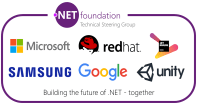The second day of Connect(); 2016 wrapped up today. While there is one more day left, it is dedicated to on-line training. This means that pretty much all the planned announcements have been, well, announced ;-)
If you’ve been watching Connect(); over the past couple of days you have likely come to the realization that, wow!, there was a lot of stuff demoed and talked about and a TON of announcements! To help you sort through some of the announcements, I’ve attempted to capture most of the highlights and related links below. If you were too busy watching and digesting all the cool things Microsoft was demoing and talking about rather than taking notes, you’re in luck!
While I doubt I was able to capture every single announcement in the list below I do think I’ve capture the majority of them. If you happen to know of an announcement that I’ve missed from this year’s Connect(); event, let me know if the comments below and I’ll add it.
With that said, happy reading…
 Microsoft joins the Linux Foundation as a Platinum member. With this, they join the ranks of other platinum members such as Cisco, Fujitsu, Hewlett Packard Enterprise, Huawei, IBM, Intel, NEC, Oracle, Qualcomm and Samsung.
Microsoft joins the Linux Foundation as a Platinum member. With this, they join the ranks of other platinum members such as Cisco, Fujitsu, Hewlett Packard Enterprise, Huawei, IBM, Intel, NEC, Oracle, Qualcomm and Samsung. Visual Studio 2017 RC is announced (formerly known as Visual Studio “15”). There are tons of new features and improvements to Visual Studio 2017. While I’ll write about many of the updates in posts yet to come you can read most of the details here.
Visual Studio 2017 RC is announced (formerly known as Visual Studio “15”). There are tons of new features and improvements to Visual Studio 2017. While I’ll write about many of the updates in posts yet to come you can read most of the details here.- Visual Studio Team Foundation Server 2017 RTMs. Lots of improvements and new features! Read more about them here.
- Visual Studio for Mac Preview is announced for the first time. The first preview includes support for building native apps for iOS and Android using C# and F# through Xamarin as well as back-end support through Azure-connected services and support for ASP.NET Core. Visual Studio for Mac will be included as part of a Visual Studio Subscription. There are also plans to provide a free Community Edition.
- Visual Studio Mobile Center is announced. Visual Studio Mobile Center is mission control for your mobile apps. Visual Studio Mobile Center helps you automate your mobile lifecycle by providing services such as automated builds, testing on real hardware in the cloud, app distribution, crash reporting and analytics. If this is something you’d like to try out you’ll need to request an invitation to get started.
 Google joins the .NET Foundation Technical Steering Group joining Microsoft, Red Hat, JetBrains, Unity and Samsung.
Google joins the .NET Foundation Technical Steering Group joining Microsoft, Red Hat, JetBrains, Unity and Samsung.- Samsung releases a preview of .NET Core support for the Tizen operating system and their Visual Studio Tools for Tizen.
- .NET Core 1.1 announced. This is considered to be the first “Current” release. .NET Core 1.1 apps are supported in Visual Studio 2015, Visual Studio 2017 RC, Visual Studio Code and Visual Studio for the Mac. You can download .NET Core 1.1 here.
- Entity Framework Core 1.1 announced. Read more about it here.
- .NET Core Tools MSBuild “alpha” announced. The new release can be used with both the .NET Core 1.0 and .NET Core 1.1 runtimes. Read more about it here.
 Xamarin Inspector announced for Xamarin for Visual Studio. The integrated iOS Simulator for Visual Studio and Xamarin Profiler are now fully-supported and generally available to all Visual Studio Enterprise subscribers. Additionally, the Workbooks interactive learning tool is now generally available to all Visual Studio users. Xamarin.Forms Previewer is now also available as a preview for Visual Studio developers on Windows, alongside the previously announced preview available on Mac.
Xamarin Inspector announced for Xamarin for Visual Studio. The integrated iOS Simulator for Visual Studio and Xamarin Profiler are now fully-supported and generally available to all Visual Studio Enterprise subscribers. Additionally, the Workbooks interactive learning tool is now generally available to all Visual Studio users. Xamarin.Forms Previewer is now also available as a preview for Visual Studio developers on Windows, alongside the previously announced preview available on Mac.- Xamarin Test Cloud now supports the Appium framework.
- Lots of announcements around Visual Studio Team Services (VSTS) and TFS 2017, including:
- Azure App Services Continuous Delivery
- Release Management General Availability
- Public Preview for Work Item Search
- Code Search on Team Foundation Server 2017
- Package Management General Availability including support for npm
- Ability to import a TFS Database into VSTS
 Visual Studio Tools for Docker. Includes multi-project debugging support for single and multi-container scenarios, publishing to Azure App Service as a container integration with CI/CD to Azure Container Service, and Windows Server Container debugging for .NET Framework apps.
Visual Studio Tools for Docker. Includes multi-project debugging support for single and multi-container scenarios, publishing to Azure App Service as a container integration with CI/CD to Azure Container Service, and Windows Server Container debugging for .NET Framework apps.- General availability for Azure Functions announced. You can
read more about it here.
Also, if you want to learn how to create Azure Functions, take the Azure
Functions Challenge for free!  General availability for Azure
General availability for Azure
Application Insights announced. You can read more
about it here.- Azure Bot Service announced. The Azure Bot Service empowers developers to rapidly build bots powered by the Microsoft Bot Framework, deployed and run on the Azure serverless cloud.
- Azure App Service on Linux (Preview) now supports Containers and ASP.NET Core. Read more about it here.
- Azure Container Service (ACS) upgrade. This series of updates includes: Kubernetes support in Azure Container Service (in preview), DC/OS Upgrade to 1.8.4, Open Source Azure Container Service Engine, Azure Container Registry (in preview), continuous integration and deployment to Azure Container Service (in preview). Read more about it here.
- General availability for Azure N-Series announced. Starting December 1st, Azure N-Series VMs will feature the latest cutting edge GPUs from NVIDIA. N-Series VMs will be generally available across the three major geographic locations. Read more about it here.
- Public Preview of the next version of SQL Server on Linux and Windows. With this release, Microsoft brings the power of SQL Server to Linux and Windows with support for Docker containers. Read more about it here and download it here.
- SQL Server 2016 SP1 brings more SQL Server functionality to developers. With SQL Server 2016 SP1 is making key innovations more accessible to customers across editions. Developers and partners can now build to a single application programming surface to create or upgrade new intelligent applications and use the edition which scales to the application’s needs. Read more about it here.
- Visual Studio Code extension for SQL and updated connectors and tools. Microsoft Visual Studio Code users can also now connect to SQL Server, including SQL Server on Linux, as well as Azure SQL Database, Azure SQL Data Warehouse. Microsoft also released updates to SQL Server Management Studio, SQL Server Data Tools, and Command line tools which now support SQL Server on Linux. Additionally, Microsoft has released a portfolio of updated tooling and connectors to enable developers to be more productive with SQL Server across Linux, PHP, Java, Python, Ruby, and Node.js, including a JDBC Driver which is now 100% open source.
- General availability for Azure Data Lake Analytics and Store. This is a cloud analytics service for developing and running massively parallel data transformation and processing programs in U-SQL, R, Python and .Net over petabytes of data. There is no infrastructure to manage and data can be processed on demand, enabling scale in seconds, while only paying for the resources used. Read more about it here and here.
- Azure Data Lake Tools for Visual Studio Code Public Preview. These tools provide users with the best in class light weight, keyboard focused authoring experience for U-SQL as an alternative solution to the Data Lake Tools for Visual Studio. Read more about it here.
- Azure DocumentDB introduces a new emulator into preview. The free Azure DocumentDB Emulator allows for easy offline development and is initially available for Windows-based development. Developers can also enjoy support for DocumentDB with .NET Core. Read more about it here.
- General availability for R Server for Azure HDInsight. This gives Azure HDInsight the most comprehensive set of ML algorithms and statistical functions in the cloud that also leverages Hadoop and Spark. Read more about it here.
- Kafka for Azure HDInsight Public Preview. Provides enterprise-grade open-source stream ingestion service for doing real-time analytics. Read more about it here.
- Next version of R Server and R Client pre-announcement. The next release of R Server and R Client will also be available before the end of calendar year.
- Azure PaaS services available for Azure Stack Technical Preview 2 (TP2). This release includes Azure App Service (includes Web Apps, API apps, and Mobile apps) and updated versions of SQL/ MySQL database. Read more about it here.
- Azure Advisor Public Preview. Azure Advisor is a personalized recommendation engine that provides proactive best practices guidance for optimally configuring your Azure resources. Read more about it here.
- Redaction Preview available globally. Starting today the Azure Media Redactor public preview will be available in all public Azure regions as well as US Government and China datacenters. This preview is free of charge for the time being. Read more about it here.
- Announcing VMware backup with Azure Backup Server. Azure Backup Server now supports VMware VM backup to disk and to cloud for offsite copy or long term retention. Read more about it here.

